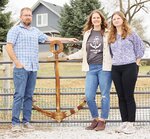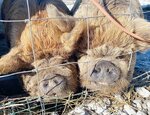

Anchor Meadow Farm sits on six acres of land near Milford and is home to organic crops, community-minded values and a breed of pigs from New Zealand.
Matt and Emely Hendl typically have anywhere from 20 to 80 Kunekune pigs on their farm at any given time, depending on the season and markets.
The couple did not always know they wanted to farm. After Matt retired from 20 years of service in the Navy, they moved from Connecticut to Nebraska to be closer to Emely’s family and hometown of Utica.
They found a place near Milford and started Anchor Meadow Farm in 2017 after being inspired by seeing their neighbors raise their own vegetables and chickens through community-supported agriculture.
“I worked a lot of farmer’s markets with my two neighbors, too. And, I was like, ‘This is something relaxing and something I’d like to gear my life towards,’” Emely said.
The pair settled on the name “Anchor Meadow Farm” because a common saying in the Navy is, “Home is where you anchor,” and their open land feels more like a meadow than a typical farm.
“We got into farming without any experience, Matt said. “We had our idea what a ‘farm’ is based on our experiences living around the world in the Navy.”
Then, it was time to find the right animal to breed. The Hendls knew they didn’t want to raise cattle because they wanted something smaller, and they tried their hands at Berkshire hogs but thought they were a bit mean and rooted too often. That’s when they learned about kunekunes.
In the 1980s, a couple of New Yorkers rescued a breed of pigs called kunekunes from extinction in New Zealand. They brought them to the United States and started breeding them. The Hendls came across some Kunekunes at the Mother Earth News Fair in Kansas and were instantly taken with them.
The owner picked up a piglet and handed it to Emely, and its mother did not even react.
“The piglet did not scream, everybody was perfectly calm and satisfied and I hadn’t seen that in an animal before. It had such a calm demeanor,” she said. “Right away, I got online and ordered six from California that night.”
The Hendls never regretted their decision.
“I simply find joy in checking on them twice a day and watching them graze,” she said. “I love that I can sit in there with the mom as she’s birthing and watch life take place and not be attacked.”
Emely said the Kunekunes are also ideal because they are safe for farm visitors.
“Little kids can run around and stick their hand through the fence, and I have no reasonable amount of fear,” she said. “When they’re walking around saying ‘hi,’ scratching ears and petting noses, I know nobody is going to lose a finger.”
Kunekunes are also unique in that their diet is made up of about 80% greens and 20% grain. They are large, slow growing and gain weight differently than other pigs.
The Hendls are one of about five registered Kunekune breeders in Nebraska.
Their pigs fully live out in the elements but have straw and barns as protection.
Emely said this makes the pigs trust them, which helps their pH level remain at normal levels. This makes for better meat.
Matt said he enjoys the routine of farming and knowing that plants, animals and people depend on farmers’ expertise to fill their needs.
“At the end of the day, it’s about the customer,” he said. “When they come back and say they can taste the time and effort we put into that product, it completes the circle and makes all this worth it.”
The couple also keeps bees. They use the bees’ beeswax and the kunekunes’ lard to make lip balm, salves and lotions to sell in their Anchor Meadow Farm shop. They also make canned produce from their garden vegetables.
Once a week, they have a farm helper, Adeline Reed, come and make dog toys and scarves. Emely’s mom makes jams, and another local woman makes seasoned pretzels and dried herb dip mixes.
Emely said the store sells items from 14 vendors all within a 60-mile range of Milford. Since the beginning, she has made it a priority that at least 90% of the things she sells are made in Nebraska.
“There’s something called ‘white labeling’ that people are really predominant with right now, and I don’t like that at all,” she said. “I could go online and order soap from a company in Las Vegas and put my name on it and say that I made it. I don’t like falsifying information.
“I want everyone to know the product was made or touched by someone in Nebraska, and we did it ourselves or they did it themselves.”
Emely said she and her husband enjoy teaching people who want to learn about organic practices. They started farming when they were 40 and want to show others that a career and lifestyle change is always possible.
“We believe in full transparency,” she said. “We believe in organic practices, and we believe in sharing the mistakes that we learned from because I felt like there wasn’t much guidance when we started seven years ago.”